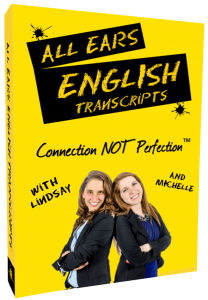
Are you participating in any home renovation projects at the moment?
How are they coming along? How are they progressing?
Today we will look at the dynamic English word “along” and we’ll find out how to use it in a bunch of different ways when you are in real and natural English conversations.
Remember, you can subscribe to the transcripts and save 50% here.
Today we are talking about the word “along” especially as it’s used in phrasal verbs.
What does it mean?
When it’s used by itself the word “along” means:
- Following the length of something
- Example: A fence runs along the river.
- Accompanying someone
- Example: My sisters likes to come along when I go shopping.
But today we’ll look at chunks that are common with “along.”
That’s an easy way to remember it.
Make sure you understand every word you hear on All Ears English.
Bring your English to the advanced level with new vocabulary and natural expressions.
Get the transcripts from today’s episode.
Learn to speak naturally with the American accent.
Here is a question from Stefano:
Hi Lindsay and Michelle.
Here’s Stefano, from Italy.
Thank you again for your super podcast! Since I started listening to it I feel much more confident in English. For one thing, it really improved my fluency. For another, now I feel okay not only when the proper words come to my month (which happens more and more often) but also when I do not know what words to use but still can easily find alternatives to get across.
Also, I realized how much I used to overlook a key fact, that the listener makes his own part to get the message delivered. Communication is a division of labor between he who delivers and he who receives the message. The job can be either a grammatically irreprehensible or a rough one – it doesn’t really matter as long as both parties pursue the same goal which consists in making the massage go. I guess this is the bottom line of connection instead of perfection, isn’t it?
In the hope of not bothering you too much, I have a new question, about the word “along”.
As to my passive English, I can understand it well enough when reading or listening other people talking. But when it comes to using it myself, I just can’t do it. Maybe the reason is that in my mother tongue language we need to combine words that are individually different as those you would use in English to deliver the meaning related to “along” (I noticed that English speakers generally use adverbs to nuance the meaning of a verb where Italians would have been using an adjective combined with the noun which the verb refers to).
So, I think that maybe the best way to get hold of the usage of “along” is to focus not on the atomic but on the molecular level i.e. not to look at the word itself but at the chunks where the word appears. Could you please help me out by giving me some of the most common ones, including those which comprise a phrasal verb (like “come along”)?
Also, I have this bee in my bonnet, which is whether there is a difference between “together with” and “along with”. Thank you so much for your wonderful work. You’re really helping lots of people to feel at home in English! Ciao from Italy, Stefano
Good question!
Today we’re going to give you four super native chunks with the word “along.”
If you learn these and then start looking for them when you listen to real English you will be on your way to sounding very natural.
Chunks you should learn:
- To come along: to accompany someone
- To move along: to get moving. When you add along it makes it sound like less of an order. For example:
- A: Hey why are you ladies stopped here? You’re in the middle of the grocery store.
- B: Oh we’re just catching up.
- A: Could you move please?
- A: Could you move along please? (How do those two feel different? The second one sounds less direct)
- To go along with: to agree with someone and participate in a plan, often not a good idea, something devious
- A: How did you end up in jail?
- B: My friend wanted to rob a bank and I went along with it.
- To play along: to take part in a deception or practical joke.
- A: Hey he thinks the party is really happening tonight. We should tell him it’s not.
- B: No, just play along for a second. It’ll be funny later.
Takeaway:
You named the true meaning of connection not perfection.
It’s not about the pieces or whether we get the right grammar.
It’s about not letting grammar, vocabulary, or anxiety prevent us from connecting.
When it comes to “along” make sure you get out there and try some of these phrases.
You can’t learn them if you don’t use them.
What questions do you have today?
Let us know in your comments below.









